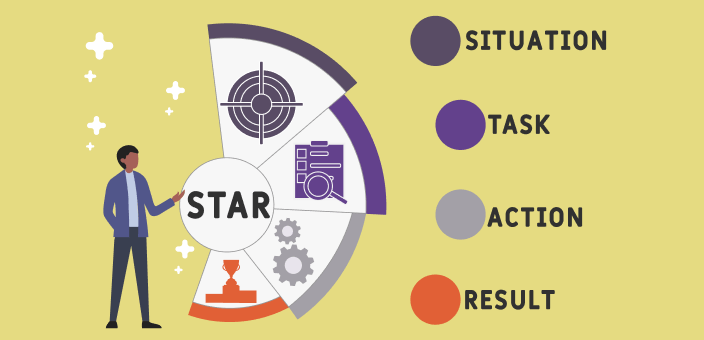Out of all the questions you may be asked at a job interview, behavioral questions are often the hardest to answer. But this doesn’t have to be the case.
When a hiring manager is asking you a behavioral question, they are often looking to hear a story: a story from your professional life that will show them that you can handle the responsibilities of the new job.
Here is what to consider when answering behavioral interview questions.
Related: How Long Do Job Interviews Last?

Table of Contents
What are behavioral interview questions?
A behavioral question asks the candidate to offer examples of specific work situations they’ve been in where they had to employ certain skills — soft skills, in particular. Today’s hiring managers like to ask these questions because they allow them to get a more realistic idea of how the new employee would behave at work.
It’s best to answer behavioral interview questions with a story. Instead of telling your future employer that you are a good team player, do your best to illustrate this with a real-life example from your previous job. This will be a much more telling way to show your employer that you will make a great addition to their team.
What is the STAR method?

When answering a question, especially at a job interview, it’s always best to have a structure in mind. According to Indeed.com, most job interviews last from 45 minutes to an hour. And during this time, you will need to convince your employer that you are the best person for the job. This is why it’s essential that you don’t waste any time and make sure you get your message across.
The STAR method is an effective way to answer behavioral interview questions. Here’s how it works:
- First, explain the SITUATION in your previous company or relevant event providing the proper context so that the interviewer can evaluate your abilities.
- Second, explain the TASK you had ahead of you. This will help your interviewer understand what you were trying to accomplish and the methods you used.
- Next, describe the ACTION you took that allowed you to complete the task successfully.
- Finally, talk about the RESULT of your actions and what you’ve taken away from the experience. It’s also a good place to add quantitative data to your story to clearly demonstrate the successful outcome of your actions.
Examples of behavioral job interview questions
It’s impossible to write down a list of the exact behavioral interview questions you may be asked. We wish it were this simple.
However, there are several popular categories of behavioral questions that you may be asked in an interview. Sure, your interviewer may phrase them differently. But going over the questions below may give you a good idea of what to expect in an upcoming job interview.
Related: The 10 Most Common Job Interview Questions.
Teamwork behavioral questions
Most jobs require you to work with other people. So, you will need to be ready to answer questions that will showcase your abilities as a team player. Some of these questions may sound something like this:
Tell me about the last time you’ve had to work with someone whose personality and work style was different from yours.
Give me an example of how you resolved a workplace conflict.
Talk about the last time you had to demonstrate leadership skills in the workplace.
Tell me about the last time a colleague made a mistake that affected your work and how you handled the situation.
Adaptability behavioral questions
Starting a new job means adapting to a new environment. And your employer may ask you about how well you can adapt to new work situations and people. You may be asked to answer questions such as:
Tell me about the last time you were under a lot of pressure at work.
Describe a time when your team/company was going through change/transformation and how you handled it.
Tell me about your first week in your previous job.
Give me an example of when you had to make a decision quickly?
Do you find it difficult to meet new people? Tell me about a time you had trouble being a team player?
Time management behavioral questions
Time management questions are typically aimed at learning how you handle multitasking, high pressure situations, deadlines and more. Here are some examples of the questions you may be asked:
Give me an example of the last time you had to work on several things at once?
Tell me about a time when you got overwhelmed with deadlines. How did you handle that situation?
How do you make sure you meet your work goals on time?
Tell me about a time when an unexpected issue disrupted your planning?
Communication behavioral questions
Hiring managers will often use the following questions to ask you about your communication abilities.
Give me an example of the last time you used communication skills to convince a colleague to work on a project your way.
When was the last time you used negotiation skills at work? Give us an example of how this went.
Give me an example of a difficult conversation you had at work.
Tell me about the last time you had to do a presentation or use your public speaking skills? How did it go?
Behavioral questions on work goals and motivation
Motivation is one of the most valued qualities in the workplace. According to Business2Community, motivated employees outperform unmotivated employees by over 200%.
Employers often want to know what motivates you at work. Learn how to answer the popular “What Makes You Stand Out from Other Candidates?”
They may ask you the following behavioral questions to find it out.
Tell me about your biggest professional accomplishment.
Describe the last time when you took initiative at work.
Give me an example of a work project you were the most passionate about.
Tell me about that time you had to work on an important project with minimal supervision.
What motivates you to get creative at work?
Tell me about the last time you felt dissatisfied with your work?
Read our post on the Best Questions to Ask an Interviewer.
How to answer common behavioral interview questions using the STAR method?
Now, let’s take one of the questions above and see how we can answer it using the STAR method.
Give us an example of how you handled a conflict in the workplace.
Answer:
Situation: When I had been in my previous job for a little over a week, I was put in charge of an important designer campaign for a big client. But as I was a new hire, some designers in my team didn’t know much about me and didn’t think I would do a good job. I felt like I was being undermined at every step and it was substantially slowing down my progress.
Task: I knew I had to do something to diffuse the situation so that I and my team and I could go back to the project and complete it on time.
Action: My plan to resolve the conflict was simple.
I got the team together and talked to them about my experience handling similar projects. We brainstormed ideas, discussed different approaches, shared our design and more.
Result: As a result, the team got to know me and my professional experience better. They learnt that I was open to new ideas and had the necessary qualifications and communication skills to be in charge of the project.
Related: “Sell Me This Pen” Interview Question
More tips for answering behavioral interview questions
Here are a few extra best practices for answering behavioral interview questions.
Have a few stories ready. Prepare a few stories from your previous employment that fit the job you are applying for. Before the interview, scan the job description one more time and pick out the skills that the employer is looking for. If they emphasize leadership skill, look for examples from your previous jobs that illustrate that you are a good leader. If the new job requires you to take initiative, think of examples of you taking initiative when working in other companies.
Keep your answers structured. Make sure there is a clear structure to your answer so that the hiring manager doesn’t get lost in your story. You can use the STAR method described above or your own layout to plan to help you with storytelling.
Don’t forget the conclusion. Make sure to wrap up your story with the conclusion that shows your new employer that you have the skills they are looking for. Highlight the fact that you’ve managed to solve the situation and you have the necessary skills to do so in the future.
Practice. It may sound ridiculous but it’s a good idea to practice answering the interview questions you expect to receive at home. This will give you more confidence when answering the real question. Plus, you will see how your answers come across and will have the time to make any necessary adjustments.
How to answer behavioral interview questions: summing things up
So, here are our key takeaways.
- Behavioral interview questions aim to show the employer how you use specific skills in the workplace.
- When answering such questions, make sure to give your answers a clear structure. We suggest using the STAR method.
- Prepare for the interview questions ahead of time. This will give you some time to think, adjust your answers and find the best and most relevant examples from your previous work.
There are other things worth looking into as you are getting ready for an important job interview: What are the Best Outfits For an Interview?